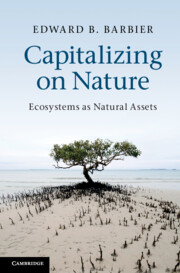Book contents
- Frontmatter
- Contents
- Figures
- Tables
- Boxes
- Acknowledgments
- Introduction
- 1 Ecological scarcity as an economic problem
- 2 Ecosystem services and ecological landscapes
- 3 The basic natural asset model
- 4 Spatial variation in ecosystems
- 5 The open economy
- 6 Ecological collapse
- 7 The way ahead
- 8 Policies in the Age of Ecological Scarcity
- Index
- References
5 - The open economy
Published online by Cambridge University Press: 05 June 2012
- Frontmatter
- Contents
- Figures
- Tables
- Boxes
- Acknowledgments
- Introduction
- 1 Ecological scarcity as an economic problem
- 2 Ecosystem services and ecological landscapes
- 3 The basic natural asset model
- 4 Spatial variation in ecosystems
- 5 The open economy
- 6 Ecological collapse
- 7 The way ahead
- 8 Policies in the Age of Ecological Scarcity
- Index
- References
Summary
There is no pleasure in reporting the suspicion that despite all the rhetoric, the world does not care too much about biodiversity conservation. Maybe the efforts of economists and ecologists will force a change of policy in the future. But the proper place to begin is with an honest appraisal of just how little we do.
(Pearce 2007, p. 331)Introduction
Many of the world’s most important ecosystems are found in developing countries that are undergoing rapid land use change and resource extraction as part of the process of development (see Chapter 1). The majority of these economies are highly resource dependent, in that primary product exports comprise at least half of their total merchandise exports (Barbier 2005). The result is that there is a tradeoff between increased development activities, the products of which are often sold on world markets, and the conservation of ecological landscapes.
As many developing countries participate as small open economies in world markets for their products, the implications for changes in the terms of trade are relevant. At the same time, there is increased policy interest in international payments for ecosystem services as a way of increasing conservation in developing economies. One possibility is to compensate these economies for foregoing the export earnings that could otherwise be earned from development activities that require converting ecological landscapes. Such compensatory transfers serve indirectly as payment for ecosystem services, because they essentially subsidize developing economies to conserve rather than convert ecological landscapes, thus generating a greater flow of ecosystem services. Payments for the conservation of standing forests or wildlife habitat are the most frequent type of compensation programs used in developing countries, and they have been mainly aimed at reimbursing landowners for the opportunity costs of carbon sequestration, watershed protection, and biodiversity and landscape conservation.
- Type
- Chapter
- Information
- Capitalizing on NatureEcosystems as Natural Assets, pp. 152 - 198Publisher: Cambridge University PressPrint publication year: 2011



